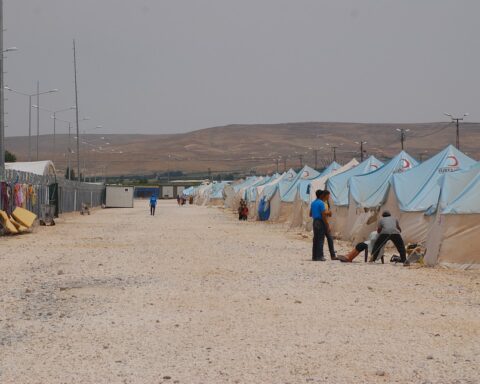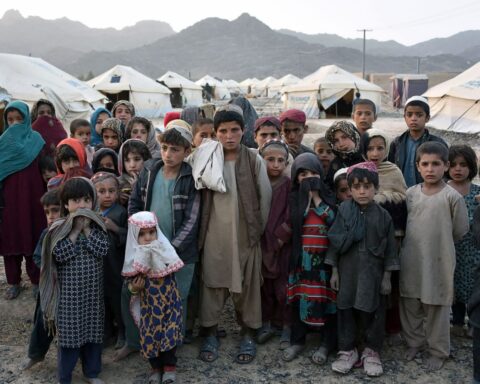The surprise – at least to some – victory by Republican candidate Donald Trump over his Democrat rival Hillary Clinton in Wednesday’s U.S. presidential election has already led to speculation over what a Trump administration means at both the domestic and international level.
At home, he has been hawkish on immigration and may try to deport millions of undocumented American residents. Outside the U.S., he has vowed to tear up trade agreements like NAFTA and impose tariffs on trade partners such as China.
On the environment, he has expressed skepticism about global warming and threatened to cancel the US commitment to the Paris Accord.
But what about terrorism? What can we expect from a Trump presidency on the international and U.S. “war on terrorism”?
Future policies are difficult to determine and much can change, although we can guess some of the incoming administration’s moves based on statements made and positions outlined during the campaign, even while recognizing that these are rife with inconsistency.
A few of Trump’s possible approaches will have a near-term positive effect on our collective battle against violent extremism, but on balance they will make things worse. Here are a few things to watch for:
- On defeating the so-called Islamic State (IS), Trump vowed to go on the cyber offensive and recruit NATO to “invade IS strongholds in the Middle East and ‘knock the hell out of them’”. Assuming that he orders a more robust military response to the terrorist group, the effectiveness of that response will depend on the precise measures deployed. Special forces raids on identified high priority targets – think the successful killing of al Qaeda leader Osama bin Laden in Abbotabad in May 2011 – are the least likely to result in collateral damage or raise much objection. After that, it gets less easy. Drones are one tool, although the effect on innocent bystanders is probably higher than reported. Airstrikes are even less targeted. The worst scenario is a boots on the ground invasion as in the case of Iraq in 2003, which would give IS or others a new base of support (invasions tend to do that). In the short term, terrorist groups lose territory and influence but, in the longer term, the ideology underpinning these groups simply finds a new home. IS has already celebrated the Republican’s victory and stated that the “billionaire fool” will ruin the US and allow IS to take control of the country.
- On allying with Vladimir Putin’s Russia, Trump could leverage combined assets to speed up IS’ demise. The down side is that Russia is also targeting groups with which the US is allied. More importantly, Russia is trying to keep the Assads in power and a continued Alawite regime will invite more terrorist opposition down the road.
- On immigration, Trump has vowed to stop the immigration of Muslims “until we figure out just what the hell is going on” and to refuse entry from countries associated with terrorist groups. He has also criticised any intake of Syrian refugees and would submit those who do come to “extreme vetting”. While this policy could prevent some terrorists from infiltrating the U.S., it does not cover those who come from otherwise “safe” countries such as France, Germany or the U.K.. It should be stressed, however, that the number of terrorists using the immigration/refugee system is dwarfed by the true “homegrown” threat of those born and radicalized to violence entirely in the U.S .(and for which there is no immigration or citizenship revocation “solution”). Furthermore, Trump has essentially made Muslims, including those born in the U.S., feel like unwanted citizens and this helps to feed the extremist narrative that the West hates Islam and does not allow Muslims to practice their religion freely (hence the call for hijrah to Muslim areas such as IS’ Caliphate).
- Current U.S. President Barack Obama was big on Countering Violent Extremism (CVE) and even convened a summit on this issue in February 2015. It is highly unlikely that President Trump will have much time for CVE, seeing it as “wimpy”. This is unfortunate as CVE, while not a panacea, is an important part of counter terrorism strategy. Conversely, were the President to support CVE, it is hard to see how American Muslims buy into the administration’s efforts in light of Trump’s vilification of them.
- On the domestic terrorism front, Trump has actually paved the way for an increase in the threat level, but not in a direction assumed by most Americans. The greatest terrorist menace in the U.S. comes not from Islamist extremists, whether foreign or domestic, but from a variety of right wing groups ranging from sovereign citizens to radical militias to white supremacists. The Trump campaign gave voice to these actors and it is likely that we will see a continued spike in the activity of such groups. It is ironic that a huge increase in the existence of these extremist organizations during the Obama years, as reported by the U.S. Southern Poverty Law Center, may be surpassed under a Trump administration. This, together with Trump’s avowed support for the Second Amendment and desire to protect gun rights, could make the U.S. a much less safe country. Groups like the Ku Klux Klan have already welcomed a Trump presidency and are likely to feel emboldened under his rule.
All in all, it is difficult to see any long-term pluses on counter-terrorism under President Trump. Initial successes against IS and others through military action will more than adequately be offset by his propensity to provide ammunition for future supporters and groups through his position on Islam and immigration.
The Trump presidency – whether one or two terms – will possibly leave us in a worse position vis-a-vis terrorism than the one we find ourselves in now.
Should he choose his advisors wisely and build on existing successful approaches, we may collectively be better off. And yet, a significant terrorist attack on U.S. soil attributed to a foreign actor – inspired, planned, directed or executed – would create a whole new set of variables and responses. Let us hope that such a scenario does not transpire.
Phil Gurski worked for more than three decades in Canadian intelligence, including 15 at Canadian Security Intelligence Service (CSIS), and is the author of the Threat from Within and the forthcoming Western Foreign Fighters (Rowan and Littlefield). He blogs at http://www.borealisthreatandrisk.com/blog/
Phil Gurski is a former terrorism analyst at the Canadian Security Intelligence Service (CSIS). He specializes in radicalization and homegrown Al Qaeda/Islamic State/Islamist-inspired extremism and has published several books, including the forthcoming When Religions Kill: how extremists justify violence through faith.” He is a member of New Canadian Media’s board of directors.





